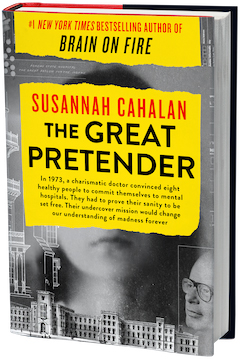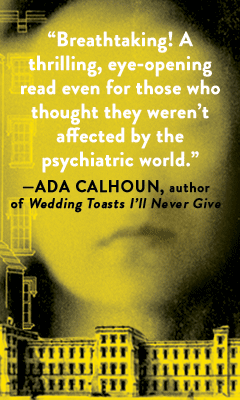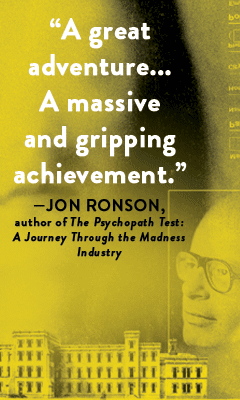The Great Pretender: The Undercover Mission That Changed Our Understanding of Madness
by Susannah Cahalan
Where lies the divide between an illness in the brain and an illness in the mind? Is there a divide? As famed Stanford psychology professor David Rosenhan asked, "If sanity and insanity exist, how shall we know them?"
These questions anchor Susannah Cahalan's The Great Pretender: The Undercover Mission That Changed Our Understanding of Madness, and the stakes involved in answering these questions are high. As Cahalan puts it, the ability to answer has wide-reaching effects: "from how we medicate, treat, insure, and hospitalize, to how we police and whom we choose to imprison."
Cahalan's investment in the topic is personal. She recounted the story of her own experience with mental illness in her 2013 runaway bestseller Brain on Fire, which Netflix adapted into a film the same year. At the age of 24, she found herself hospitalized with a disease whose symptoms aligned alarmingly with schizophrenia.
"Diseases like the one that set my brain 'on fire' in 2009 are called 'the great pretenders,'" she explains, "because they bridge medical worlds: their symptoms mimic the behaviors of psychiatric illnesses, but have known physical causes, autoimmune reactions, infection, or some other detectable interferences in the body." Cahalan has since traveled widely, telling her story to audiences across the world. But even she found herself slipping into a mode of thinking that distinguished the psychiatric from the physical--and she wanted to better understand why. Where Brain on Fire delved into Cahalan's experience of being a patient herself, The Great Pretender probes the systems that shape a patient's experience, exploring historical and contemporary frameworks for understanding them.
Cahalan starts with a whirlwind history of mental healthcare in the United States, highlighting moments of innovation and infamy and sketching its most controversial patrons and purveyors. She traces Nellie Bly's famed 1887 exposé on the women's asylum on Blackwell's Island; the impacts of activist Dorothea Dix in the mid-1800s; and the tragedy of Rosemary Kennedy and others whose families' approach to "treatment" ranged from ethically ambiguous to outright horrific. A sampling: Charles Dickens, trying to commit his wife, Catherine, so that he could have an affair with another woman; Sir Edward Bulwer-Lytton--of "It was a dark and stormy night" fame--similarly trying to have his inconvenient wife committed; 20% of the mentally ill in Switzerland kept restrained in their homes; a man chained by his neck to a wall in a London hospital for 14 years, unable to move more than a foot.
What makes many of the stories so shocking is the uncertainty in whether those committed to asylums in any way "belong" there. In the midst of her research, Cahalan learns of a study from the 1970s that gets at the very same issues: Dr. David Rosenhan's landmark 1973 report "On Being Sane in Insane Places." It was a study that had an explosive impact on the field of psychiatry. Rosenhan's starting point, in his own words, was the question "How many people, one wonders, are sane but not recognized as such in our psychiatric institutions?" As Nellie Bly had done almost a century before, Rosenhan decided the best way to investigate would be to get himself admitted to a mental hospital as a patient--and then to behave as he normally would. Would anyone notice?
To bolster his study, Rosenhan recruited others as well. In all, eight "pseudopatients" spent time in asylums across the United States, documenting their experiences with exhaustive notes. To get themselves admitted, all claimed to be hearing voices that repeated the words, "thud," "empty" and "hollow." All were committed. All were diagnosed. All were medicated. All, of course, weren't actually sick.
In the era of One Flew Over the Cuckoo's Nest, Rosenhan's experiment flew in the face of the cult of psychiatry. The renowned journal Science published the article. The enormity of its impact is hard to overstate. People reconsidered how they viewed psychiatry. Psychiatrists reconsidered how they saw themselves. The study led to a complete overhaul (one of several) of the Diagnostic and Statistical Manual of Mental Disorders (DSM). More than four decades later, Rosenhan's experiment is still widely taught in introductory psychology courses.
Rosenhan died in 2012. To learn more about him, Cahalan visits his longtime Stanford colleague and friend, Lee Ross. Rosenhan had entrusted many of his files to Ross, who shares them (with the notable exception of one file Ross deemed "personal") with Cahalan. She pores through Rosenhan's notes. And then she gets a bit concerned. As Cahalan pieces together the story of what may really have happened in the study--or, perhaps more accurately, what may not have really happened--inconsistencies arise. Then inaccuracies. Then outright lies.
What results is a fascinating, nuanced and engrossing journey to better understand the study that led so many in a field to question whether it really understood itself. Cahalan researched The Great Pretender over the course of five years, but the pages practically turn themselves. It's absorbing, sometimes sobering, sometimes seriously funny. Cahalan's narration makes the reading great fun, with an urgency occasionally akin to a thriller.
At its core, The Great Pretender is a multifaceted portrait of a study that, no matter its complications, fundamentally shook the foundations of psychiatry. Cahalan invites us to reconsider how many fallacies about the mind and brain we may all still simply be taking for granted. She raises more questions than answers, but along the way Cahalan helps us learn how to ask better questions about what madness is, how we should name it and how we might better care for those it afflicts. --Katie Weed







